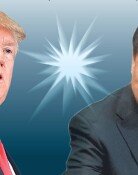Presidential candidates should show sincerity with pension reform policy
Presidential candidates should show sincerity with pension reform policy
Posted February. 05, 2022 07:16,
Updated February. 05, 2022 07:16
Four major presidential candidates agreed during Wednesday’s TV-aired election debate on pension reform whoever will become president. Minor opposition People's Party Ahn Cheol-soo brought up the need to renovate the pension system. In response, main opposition People Power Party’s Yoon Suk-yeol replied that bipartisan efforts should be made starting from early days of the next administration to seek public agreement. Ruling Minjoo Party’s Lee Jae-myung added, “I agree on the need for pension reform to resolve inequalities and social divides including the shrinking pension budget. Minor opposition Justice Party’s Sim Sang-jung also expressed her support of the purposes of pension reform, saying that reform should involve a wider range of discourses and changes than the integration with special occupational pension plans do.
A reservoir of South Korean national pension funds will be drained by the year 2057 as the national pension system is negatively affected by social changes such as low birthrates, population aging and low growth. If the current trends continue to cause lack of pension funds, future generations will have to pay 29.3 percent of their income for pensions. Young generations will only have a greater financial burden of insurance premiums considering that the nation is seeing an unprecedented trend of a shrinking population where working age population groups from 15 to 64 years old are estimated to decrease by 3.2 million over 10 years. Moreover, most of 7.23 million Baby Boomers, born after the Korean War in 1950, will retire within the next administration’s period to shift from pension payers to recipients.
It is welcome news that presidential candidates reached agreement on pension reform with imminent risks right at the doorstep. However, reform never happens in empty words alone. Yoon said during the debate, “It may be a risky decision to announce pledges solely based on directions hastily set during the presidential campaign, implying his carefulness in dealing with the issue. Lee also remarked that it is not easy to propose a unified plan given intricated interests, asking back, “Mr. Ahn may not be able to articulate burden rates and take-up rates.” Ahn also did not specify detailed action plans. Vaguely uttered promises will only cause the next administration to follow in the footsteps of the current one excusing that such reform runs against public sentiment.
Despite all sensitivities around reform to the national pension system, there is no complexity in directions and means. In a situation where it is not feasible to boost growth and birthrates immediately, the right answer is to let citizens pay more but get paid less; or pay more to get paid at the current levels if we intend to make a drain on funds happen later. It is not an overstatement to say that the key to a successful pension reform lies in the next government’s determination which may be implied by premium rates and pension benefit rates. Presidential candidates should humbly wait for voters to make decisions while proposing a detailed set of reform targets as part of their pension policies.







